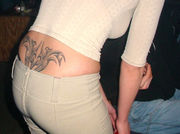They came up in the late 1990s, at the same time as the deep-seated low-rise pants and belly-bearing tops. Because of that style trend, they were visible to everybody. We’re talking about the V- or T-shaped tattoos on the back, just above the bottom, which were initially called ‘lower back tattoos’. We can see them still a lot in America but in Germany, the name is, oh so beautiful, Arschgeweih (ass antlers).

On the one hand, this unflattering name goes back to the usual form of the tattoo. On the other hand, however, it is supposed to belittle the carriers of such a tattoo who are often stamped as sluts or slovens. The German comedian Michael Mittermeier, who is said to have invented the term Arschgeweih, sometimes even uses the expressions Schlampenstempel(sloven hallmark) und Landehilfe (landing aid) during his stage shows…
The liquor manufacturer ‘Jägermeister’ reversed the trend and picked ‘Miss Arschgeweih’ on a nationwide annual tour through German pubs and clubs since 2004.
Nonetheless, the Arschgeweih has slid down the popularity scale very fast. Who still asks for such a tattoo nowadays is regarded as hopelessly outstanding. Many carriers find their youthful folly downright embarrassing in the meantime. Fortunately, the fashion of the low-rise pants and belly-bearing tops is fairly over…
Popular Anglicisms: Handy
The German term „Handy“ is no classical Anglicism because there’s no such noun in English. Nevertheless, the Germans adopted this term, meaning a cell or mobile phone. The term “Handy” is short, easy to remember and – yes handy, like the object itself. Therefore, the word creation wasn’t so bad. But I don’t like it anyway. Do you?
Maybe my rejection originates from the time when cell phones were rather new in the market and many people regarded them as status symbols. So the first people who used them in public were, apart from businessmen who really needed them, people who wanted to be in vogue at any price. And many of them were. I think you know this kind of folks, being as noisy and annoying as their cell phones’ ring tones.
Well, I still remember one special scene in a café as I was on a holiday trip in Germany some years back: I was sitting there with some friends, when a group of girls, perhaps 15 or 16 years old, entered the café, sat down at the table next to us and immediately started yattering. The most annoying chatterbox of them was called Mandy (a typical German name…). – A flashy, rouged, acoustic plague with bleached hair and polished fingernails.
In her mouth, she had chewing gum, so big that she couldn’t shut it. (But unfortunately, it didn’t prevent her from talking.) In any case, Mandy had a Handy. (Uh, that rhymes!) Of course, she had one, and of course, she wasn’t cagey about it.
This damned cell phone was in focus of the girls’ yattering all the time. (We didn’t have to eavesdrop on them, for they were loud enough.) I can’t remember how often the phone rang, but its piercing ringtone is still spooking in my ears.
Do you want to know what annoyed me the most? Well, it might sound odd, but it was the way Mandy pronounced the word “Handy”. She stressed on the “a” and said something like “Haaaaaaaaaandy”, elongated like her chewing gum, in ten-second intervals.
And her voice! Oh God, I didn’t mention her voice yet! It was like, well, like fingernails scratching the blackboard, like a blunt buzz saw hitting a nail in the wood, like a poorly oiled junk press. In short: It was frightful.
Another Popular anglicism: Wellness
Probably, “wellness” is actually the most misused English term in the German language. I was surprised during my trip to Germany about how the Germans were using the word. Originally meaning “a healthy balance of the mind-body and spirit that results in an overall feeling of well-being” (Wikipedia), it’s used as a description for everything that’s supposed to be somehow conducive to health or well-being these days.
Especially the advertising industry in Germany (that’s an expert in crippling language) uses the term in an inflationary way. Everything can be a wellness item: Mineral water, strawberry jam, dietary supplements, beer, bath-salts, socks, magnetic mattresses, copper bracelets, music, books – literally everything. In Germany, they’re surrounded by so much wellness that it’s a mystery to me why they still feel so bad sometimes.
Wellness is extremely popular in tourism as well. A lot of hotels and even small guesthouses provide “wellness weekends” or “special wellness offers”. Of course, a wellness weekend is rather expensive. Nowadays, if there’s a pool or a sauna, it’s called a “Wellness Oasis” or something like that.
Searching for “Wellness” on Google, I got more than 6 million hits – only in German. It’s a great hype and a good chance to make money. But I think the trend won’t expire soon since there are still unimagined possibilities for creative and enterprising minds.
What about a “wellness dentist” or “wellness loo”? I wonder why there’s still no “Wellness-Verein” in Germany; it would be typical German. They’ll be so overwhelmed by wellness that they can’t stand it.
I’m cocksure that one day they’ll get fed up with all this wellness stuff. Then they’ll jump at everything unhealthy and things that make them feel bad. And you may rest assured that this trend will exactly be up their alley…